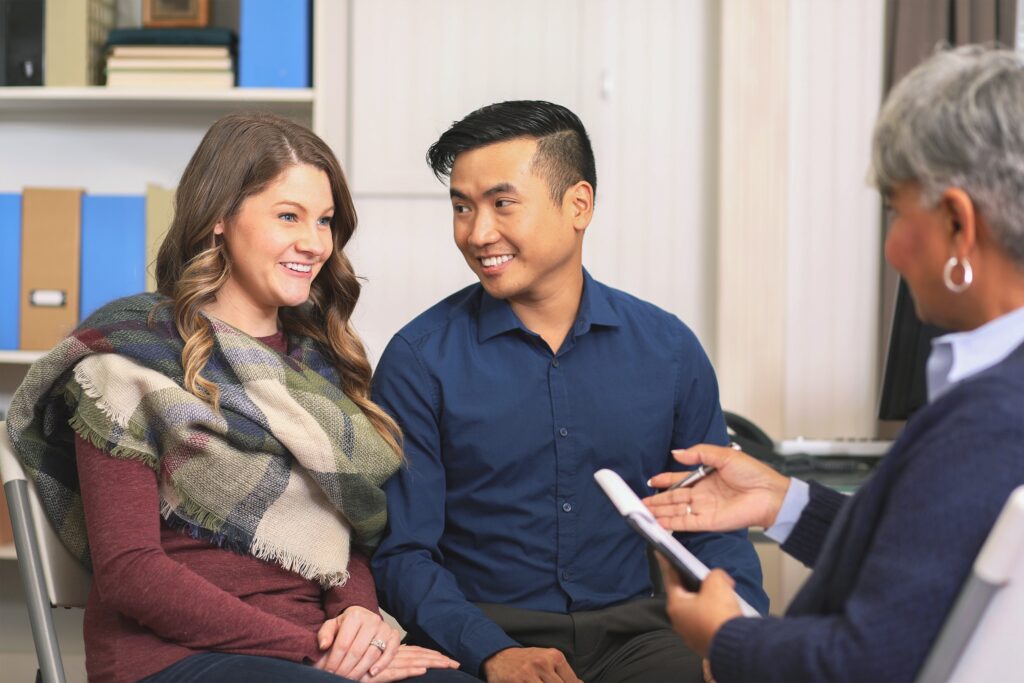[ad_1]
I remember the buzz of excitement and anticipation leading up to our wedding. Choosing a location. Sampling dishes from a local farm-to-table catering company. Asking our loved ones to play music, sew table runners, and brew cider. We made a pact to focus on our relationship first and to take breaks if wedding planning ever became too stressful. Things were going pretty well, so when my parents proposed the idea of premarital counseling, we felt taken aback, slightly offended, and closed off to the idea.
I imagine we were not the only engaged couple who thought about premarital counseling. For many decades, the dominant narrative in our culture was that premarital counseling was something you needed to do if you wanted to get married in the Catholic Church or if you had obvious relationship issues.
As a bride-to-be and a Marriage and Family Therapist in training, I was aware of these different influences on my opinion and chose to purposefully set them aside. Although we didn’t have serious issues or religious reasons, we decided to give premarital counseling a shot. After all, if I was going to work as a couples therapist and wanted to break down any stigmas around relational health, I better be willing to do some work of my own.
Contents
A Paradigm Shift for Premarital Counseling
In the seven years since our own premarital sessions and beautiful wedding, I radically transformed my perspective on premarital counseling and also feel our culture shifting its story.
Premarital counseling is a powerful process to proactively strengthen your relationship at the ideal time of marriage preparation. Rather than wait until serious issues arise, I encourage couples to use the momentum of the joyful season they’re in to deepen and elevate their relationship. Research shows that couples who go through premarital counseling have a higher relationship satisfaction and greater buffer for stress later on. Plus, going through premarital counseling when things are going well is much more enjoyable.
These days, I view premarital counseling as preventative relational healthcare. It is a powerful tool for a better relationship, which in turn contributes to a happier and healthier life.
Key Elements of Premarital Counseling
So, what does premarital counseling actually look like? While the sessions may vary depending on the model and specific counselor, most premarital counseling entails a combination of exploring your relationship dynamics and views on marriage, learning relationship skills, and co-creating goals and shared meaning together.
In my practice, I offer a 12-session pathway that includes a thorough assessment process standard in the Gottman Method, feedback on your strengths and areas of growth as a couple, and a variety of conversations and exercises covering core topics such as:
- Family of origin exploration
- Stress management and self-care
- Communication and conflict
- Emotional engagement
- Values and spirituality
- Finances and money
- Sex and romance
- Rituals of connection
- Roles, goals, and life dreams
Going through such topics with a trusted professional can help you strengthen your relationship. You’ll learn new skills, discover meaningful information about yourself and one another, and solidify your foundation.
Finding a Good Premarital Counselor
If the idea of premarital counseling sparks your interest, consider the steps below to help you find someone to work with.
Get clear on your goals. As a couple, ask yourselves: Are there specific topics you want to cover, or are you interested in a comprehensive program? Do you have complex issues that need attention first? Is it important that your counselor or therapist have certain religious affiliations?
Many couples drop tens of thousands of dollars on a wedding, but spending money on counseling is an afterthought. Counseling with a licensed professional may range from $1,000 – $3,000. Some religious organizations may offer free premarital counseling to members. Most insurance companies do not cover premarital counseling, so factor this into your wedding budget. Also, consider putting premarital counseling on your registry for your family and friends to gift to you. Gaining clarity on these questions will be helpful as you begin your search.
Research options. Use search tools like the Gottman Referral Network, Psychology Today’s “Find a Therapist,” or Google. You can narrow search results by putting in keywords like “premarital counseling,” “Gottman Method,” “LGBTQ,” or other words relevant to your needs.
Check Credentials/ Experience. As you begin to build a list of potential counselors, look for Licensed Marriage and Family Therapists. You can also research other licensed professionals such as mental health counselors, psychologists, or clinical social workers. Check to make sure they’ve had training with couples. Bonus if they trained in the Gottman Method! If you go through your religious/spiritual community, be aware that the counselors may not be licensed. Make a point to inquire about their experience.
Consultations. Whenever possible, have consultations with a few premarital counselors to ask questions about their process and to see if it’s a good fit. Some counselors have a structured process for premarital counseling, whereas others may have a generalist approach. Consider what you’d like, and take the time upfront to have these meetings.
Trust your gut. Last, but not least, listen to that voice inside of you, and talk about it with your partner. Do both of you get a good feeling meeting with this person? Do they feel like someone you could trust and open up to?
Final thought
Premarital counseling is an investment of time, energy, and money. Do your research and have some meetings. No professional is perfect, so go with the person who feels like the best fit, then dive in and get started! The long-term health of your marriage is worth it, I promise.
Are you currently looking for a Certified Gottman Couples Therapist to use research-based approaches to help your relationship? The Gottman Institute is seeking couples to participate in an international outcome study on Gottman Method Couples Therapy. Learn more here.
[ad_2]

